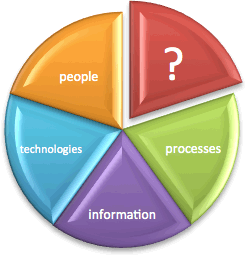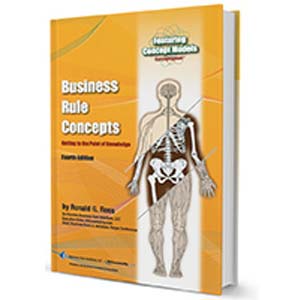Focus on What Makes Your Business Smart: From Interpretation to Implementation Introduction
Think about what makes you smart. You are smart when you make the right decisions or behave intelligently. You might not realize it, but you learn to behave intelligently through the rules you were given since you were young. When you were six months old and were just about to pick up that piece of junk on the floor to put in your mouth, your mother said, "NO! Don't do that!" That was a behavioral rule your mother gave you to prevent you from getting sick. Obeying that rule was probably a smart thing to do. Next time you saw a piece of some interesting article on the floor, you had to make a decision. Do I put it in my mouth? What would be the right decision? There is a rule to guide your decision. Do the smart thing. Listen to the rule.
Now think about your business environment. What makes your business smart? When your business builds or revises a business capability, what do your business stakeholders concentrate on? Five very natural areas are:
People — We need good people. Human Resources Departments have been around for a long time. They are set up to help manage people.
Technologies — Technologies have been around since the invention of machines. Organizations are familiar with dealing with technology changes.
Information — That was a big deal in the 1980s and 1990s during the information management era. Big data is now a hot topic in many organizations.
Process — Business process management and business process re-engineering have been popular since the 1990s. There are many techniques offered in this area.

Now, what is missing? What is the fifth piece that completes the pie? Think about it. What made you smart?
From the 'junk on the floor' story, you might guess it's decisions and rules. That's partly right, of course, but there's more. The operational intellect of your business consists of:
- operational strategies
- business concepts
- business rules
- operational business decisions
- key performance indicators
Collectively, we refer to these elements as the Operational IP (Intellectual Property) of your business.
Organizations are in the beginning stage of recognizing the need to manage their Operational IP. In this series, I will explore three of the five Operational IP elements: business concepts, business rules, and operational business decisions. I will provide a 7-step approach on gathering these elements from business source to implementation. These steps are:
- Interpret from sources
- Structure decision logic
- Analyze and refine
- Develop scenarios
- Map vocabulary to data
- Invoke tools
- Run scenarios
For business analysts all around the world, the first four steps are where you need to concentrate. That's where you will bring the biggest value to your business. So, stay tuned….
Just Remember…
Plainly speaking, here are some of the main things you need to remember:
- The 'smarts' of your business are captured in the Operational IP (Intellectual Property) of your business.
- Operational IP consists of operational strategies, business concepts, business rules, operational business decisions, and key performance indicators.
- The specification, analysis, and management of your Operational IP are often the missing components in building an effective and efficient business capability. Operational IP, working with the other four areas (people, technologies, information, and process), enables you to build smart business capabilities.
# # #
About our Contributor:
Online Interactive Training Series
In response to a great many requests, Business Rule Solutions now offers at-a-distance learning options. No travel, no backlogs, no hassles. Same great instructors, but with schedules, content and pricing designed to meet the special needs of busy professionals.











How to Define Business Terms in Plain English: A Primer
How to Use DecisionSpeak™ and Question Charts (Q-Charts™)
Decision Tables - A Primer: How to Use TableSpeak™
Tabulation of Lists in RuleSpeak®: A Primer - Using "The Following" Clause
Business Agility Manifesto
Business Rules Manifesto
Business Motivation Model
Decision Vocabulary
[Download]
[Download]
Semantics of Business Vocabulary and Business Rules